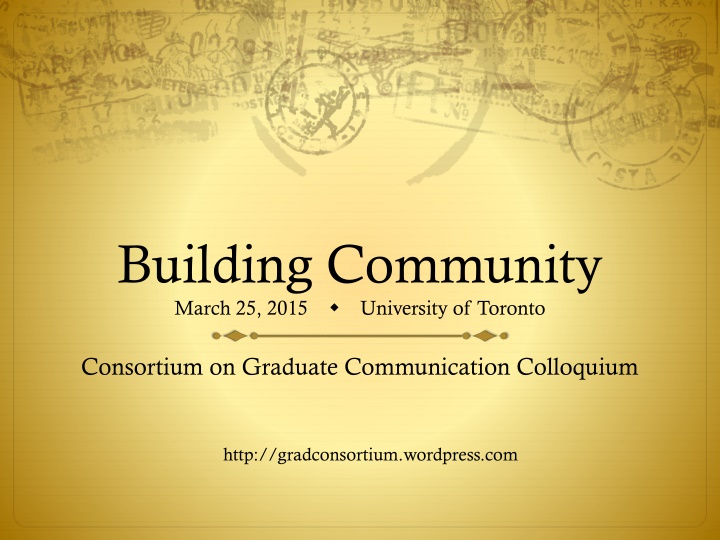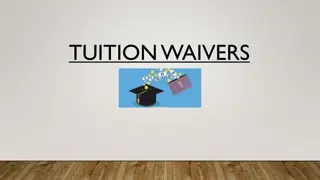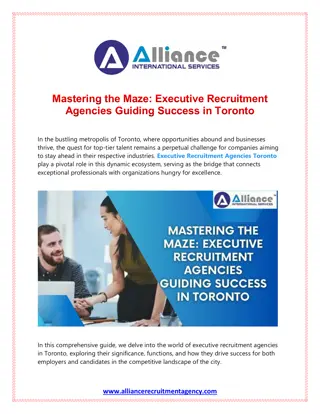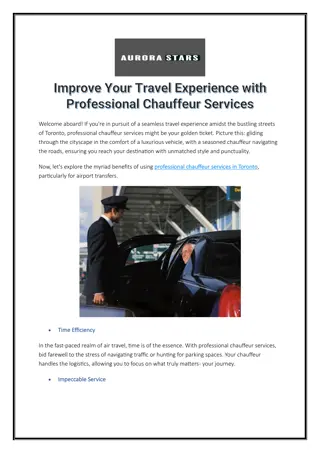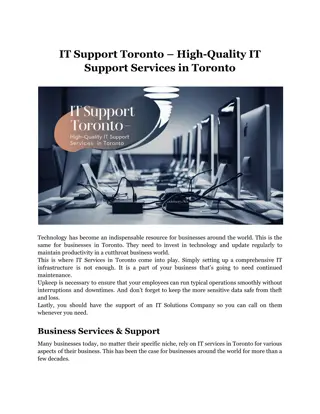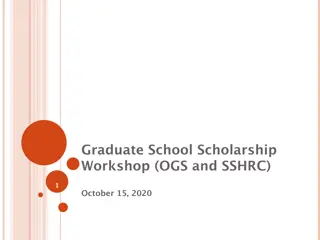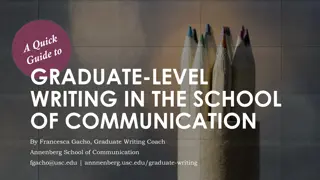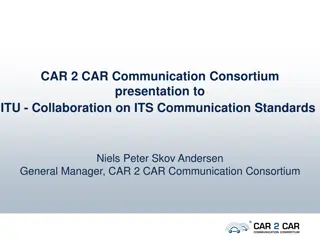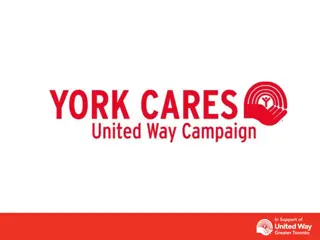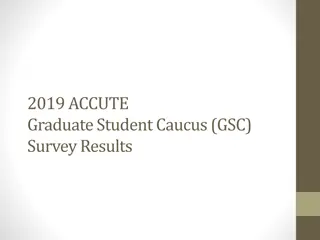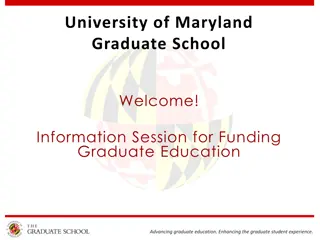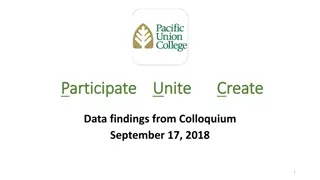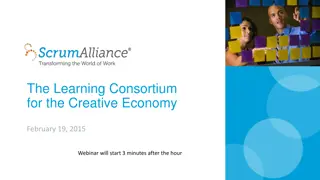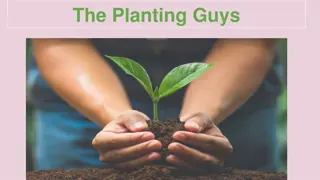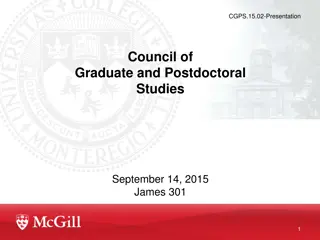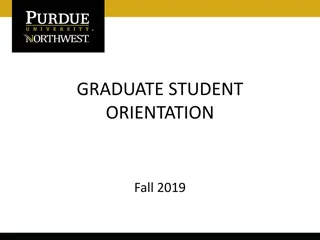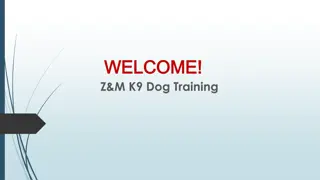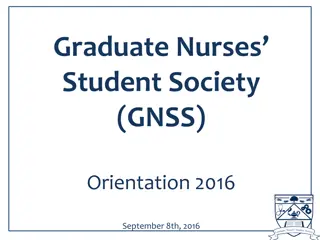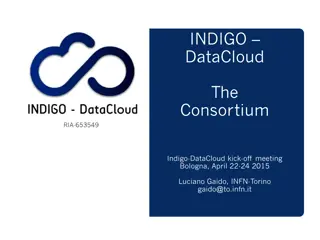University of Toronto Consortium on Graduate Communication Colloquium
Details for the University of Toronto Consortium on Graduate Communication Colloquium held on March 25, 2015. Includes program schedule, speakers, participants, and topics discussed."
Download Presentation

Please find below an Image/Link to download the presentation.
The content on the website is provided AS IS for your information and personal use only. It may not be sold, licensed, or shared on other websites without obtaining consent from the author.If you encounter any issues during the download, it is possible that the publisher has removed the file from their server.
You are allowed to download the files provided on this website for personal or commercial use, subject to the condition that they are used lawfully. All files are the property of their respective owners.
The content on the website is provided AS IS for your information and personal use only. It may not be sold, licensed, or shared on other websites without obtaining consent from the author.
E N D
Presentation Transcript
Building Community March 25, 2015 University of Toronto Consortium on Graduate Communication Colloquium http://gradconsortium.wordpress.com
CGC Co-Chairs: Nigel Caplan & Michelle Cox Colloquium Local Host: Jane Freeman Steering Committee: Kathy Brenner, Katya Fairbanks, Chris Feak, Talinn Phillips, Leo Schmitt, Steve Simpson, & Jim Tierney CGC membership: 300+ Here today: 98 participants from 52 universities
Thank you to our sponsors Office of English Language and Writing Support
Colloquium Program 1:30 The State of Graduate Communication Support Nigel Caplan and Michelle Cox 2:00 Integrating Administration, Research, and Teaching in the Service of Program Development Jane Freeman 2:30 Round-table discussions (A) 3:15 Break 3:45 Roundtable discussions (B) 4:30 Rethinking Our EAP Teaching: Some Emerging Challenges Christine Feak and John Swales 5:00 CGC Open Planning Meeting 5:30-7:30 Reception (appetizers; cash bar)
WiFi Network: UofT Password: bickersteth
Building Community Meet someone new at your table: What brings you to this event? What is your role in supporting graduate communication on your campus? Are you part of a team on your campus that provides this support or are you working solo? Are you conducting research on graduate communication?
The State of Graduate Communication Support Nigel Caplan, University of Delaware Michelle Cox, Cornell University Consortium on Graduate Communication Colloquium 2015
Why We Need CGC! Increased # of (international) grad students: 20% of grad students in the US are int l (CGS, 2014) From 2012 to 2013, first-time int l grad students rose by 11.5%, while domestic numbers fell by 2.1% (CGS) Canada has seen average growth in int l postgrads of 6.8% annually since 2007 (British Council, 2014) >20% of university students in Australia are international (ABS, 2011) Australian post-grad enrollment grew 5.9% in 2013
More Masters Increased # of master s students : Over 75% of US grads are in master s programs (CGS/ETS, 2010) In 2012/13, 53.3% of all int l grad students in the US were at the master s level, representing an 8% increase since the previous year. (Open Doors Data, 2014) Broadly, growth in master s programs in the US and elsewhere outstrips PhDs
At home, too The population of domestic students available to pursue higher education will become more diverse and possibly less academically skilled. More first-generation college students will emerge from this pool, and many are likely to require additional language and skill resources. Thus these students are less likely to resemble what has been historically the traditional student populating the graduate school enrollment pool. (CGS/ETS, 2010)
And its not going to stop By 2024, (post-)graduate mobility will increase: 4.1% in Australia and Canada 4% annually in the U.S. 111,000 more Chinese students 121,000 more Indian students 5%+ annual growth from Saudi Arabia, Nigeria, Pakistan, and Vietnam (British Council, 2014) Canada aims to double the number of international students (CBIE, 2015)
So we wanted to know What support is available for (international) graduate students? Who provides it? What professional role can the CGC play?
Survey Survey for new members of newly established Consortium on Graduate Communication (CGC), April 2014-February 2015 Questions on: Support services offered Professional affiliation Institutional position Need for CGC
Sample frame 297 responses 271 unique respondents w/ complete data 197 universities 25 countries (71% U.S., 9% Canada)
Results Graduate communication support services L2 and/or L1 students? Fragmentation of services and knowledge
Support Services Offered no services 2% Range of offerings: writing only 30% 0 to 13 writing+ oral 68% Average around 5
Support Services Offered 100% 90% 80% 70% 60% 50% 40% 30% 20% 10% 0%
Support Services Offered: Courses 90% 80% 70% 60% 50% Credit Non-credit 40% 30% 20% 10% 0% Writing Oral communication Pre-matriculation
Support Services: US Universities 100% 90% 80% 70% 60% Doctoral Master's 50% 40% 30% 20% 10% 0% Writing Center services For-credit writing courses Conversation programs For-credit oral communication courses Writing groups
Who is the support for? They are designed for native speakers but open to ESL students, 11% No response, 4% They are open to all, but targeted mainly at ESL students, 5% They are designed for and available to all, 36% They are only for ESL/ international students, 11% Some are open to all; others are only for ESL/ international students., 35%
Graduate Services: L2? Writing Classes, Oral Communication classes: usually L2 only, but not all Writing Centers, Writing Groups, Boot Camps: usually for all, but some WCs just for L2 students Pre-Matriculation programs (probably under-reported) for L2 grads
Campus Perceptions of the Support Disciplinary faculty see any type of writing instruction or support as inoculation services - so they assume that students' writing will be fixed if they attend only one writing center consultation. Compared to Last year 4,500 graduate students from 80 different doctoral programs took part in our programs. Those programs include a Writing Centre, and offering approximately 50 workshops and 75 six-week, non-credit courses per year. (University of Toronto!)
Fragmentation: Services Support depends on students department Lack of centralized unit Marginalization of IEPs and WCs
Fragmentation: Campus Homes Other support services: Student services, Center for Teaching & Learning Learning Center, Test Prep, Academic Support Library, Career Services, Intercultural Communication Research Office, OISS, Language Center Writing Center 22% Other departments: WAC/WID Linguistics, TESOL Language, Literature(s) Education General education Speech Pathology, Engineering, Law School, Business, Communications Other support service 17% Other department 15% English/ Writing 18% IEP, EAP, ELC 13% Graduate School 15%
Fragmentation: Professional Affiliation Conference on College Composition and Communication Teachers of English to Speakers of Other Languages 51% CCCC 50% 33% 29% 28% 20% 19% 16% TESOL IWCA AAAL IWAC CWPA SSLW EATAW International Writing Centers Association American Association of Applied Linguistics International Writing Across the Curriculum Conference of Writing Program Administrators Symposium on Second Language Writing European Association of Teachers of Academic Writers and 40+ other conferences or associations!
Take-Aways Huge variation in levels of support available Different approaches to graduate support Fragmentation on campus Lack of connections among educators Need for a professional/scholarly home
Roles of CGC Provide a map: who is doing what, where? Open boating lanes: provide points of connection and communication Open doors to each other s programs: how did you build a house on an island?
Integrating Administration, Research, and Teaching in the Service of Program Development Jane Freeman, University of Toronto
Roundtable Discussions (A) Table Session A (2:30-3:15) 1 Designing and Teaching Graduate Writing Courses 2 Designing and Teaching Graduate Writing Courses Designing and Teaching Graduate Oral Communication Courses 3 4 Supporting Graduate Students through a Writing Center Designing support for Native and Non-Native Speakers of English: Together or Apart? 5 6 Program Administration 7 Meeting the Needs of Multilingual Students 8 Meeting the Needs of Master s Students 9 Facilitating Boot Camps and Writing Groups
Roundtable Discussions (B) Table Session B (3:45-4:30) 1 Designing and Teaching Graduate Writing Courses 2 Designing and Teaching Graduate Writing Courses Designing and Teaching Graduate Oral Communication Courses 3 4 Supporting Graduate Students through a Writing Center Designing Support for Native and Non-Native Speakers of English: Together or Apart? 5 6 Facilitating Workshops and Workshop Series 7 Meeting Needs in Science/Tech/Engineering/Math (STEM) 8 Cross-Campus Collaborations 9 Facilitating Boot Camps and Writing Groups
Rethinking our EAP Teaching: Some Emerging Challenges John Swales & Christine Feak University of Michigan English Language Institute
CGC Open Meeting CGC website and tip sheet project: what could be added? What can you volunteer to do?! CGC annual event: what would you like to see next year? (tentatively, a 3-day institute in May/June 2016) CGC events at conferences (e.g., CCCC, TESOL): what ideas do you have? Again, any volunteers?! CGC s role in scholarship: what research is needed on graduate communication support? What roles could CGC take in this research? CGC leadership: what should our organizational structure look like? Would you like to serve? Please take notes at http://tinyurl.com/cgcplanning
Reception and a final thank you Office of English Language and Writing Support
